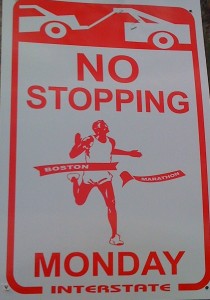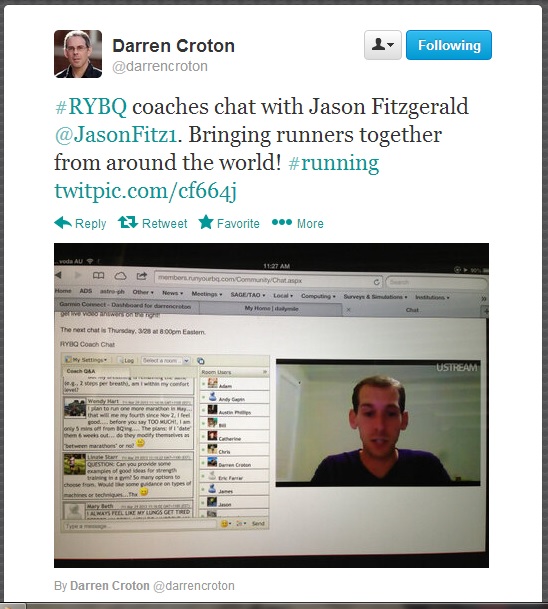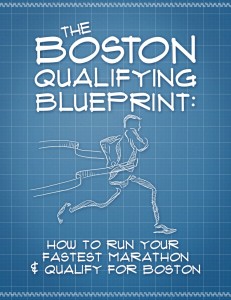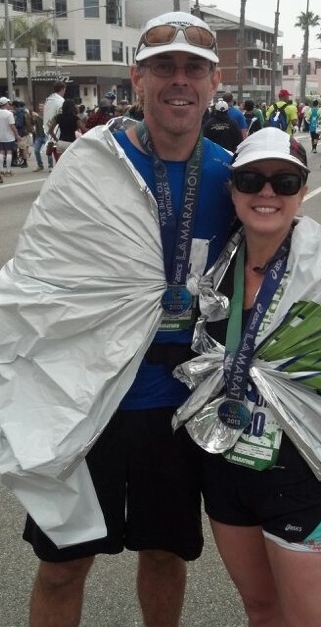When it comes to marathon training, there are countless choices to consider.
Should you join a local running club?

Download a generic training plan online?
Invest in a custom program? Get a coach? Wing it?
Ask your second cousin who ran a marathon six years ago how she did it?
If you’re like me, you enjoy the challenge of creating a marathon training cycle. Building a progression of workouts specific to your fitness level, background, and injury profile is a thrill.
And when it works out, it feels amazing. Running a personal best over 26.2 miles is a huge accomplishment – especially when you overcome problems that you encountered in the past.
Maybe this time you finished strong without hitting the wall. Or finally figured out how to taper or plan your fueling strategy.
For some of us, that achievement is but a stepping stone on a larger journey. Today I want to tell Darren’s story, a Run Your BQ member who PR’d at this year’s Los Angeles Marathon. You’ll learn how he overcame the “daunting mental barrier at 4 hours” and how he feels like he can now control his race.
But most importantly, you’ll see how he kickstarted his journey toward his long-term goal of running a Boston Qualifying marathon by the time he’s 45 years old. And you’ll be able to follow in his foot steps.
“I missed my goal (again!)”
Darren had been running for a little over two years; when he started to gain weight and experience the seemingly inevitable physical decline that comes with getting older, he knew it was time to make a change in his life.
With no experience as a runner – or in any other sports – he started with no fitness foundation. But he persevered, starting with a 5k and eventually building to a marathon.
After several marathon attempts, he had continued to fail at reaching his goal of breaking the elusive 4-hour barrier. He told me:
I hit the wall at the 22 mile mark. I was disappointed and was wondering what I had to do to run a strong, controlled (but at my limit) race for the full marathon. Could I even do this at an even, solid pace?
Darren realized that by following a free online plan he wasn’t getting the results he was looking for. He told me these plans are missing all of the extra “stuff” that distinguishes an injury-free athlete from a simple runner logging miles every week.
Before joining RYBQ, he didn’t even realize how weak his legs actually were. Using the RYBQ core, strength, and dynamic stretching routines Darren figured out that his right leg was weaker than his left. Instead of suffering a seemingly inevitable injury, he’s been healthy since joining the program.
So how did he make the jump?
Coaching + Community
After failing at his second marathon attempt, Darren knew that he needed more guidance. With no athletic background and a string of races that weren’t up to his standards, he wanted more than just a training plan. He needed coaching advice and the support from a group of passionate marathoners like himself.
Darren said:
I was looking for two things. To connect with a coach to get more personal training advice to help take my running to the next level. And to connect with a community of like-minded runners for support, advice and inspiration, people who have had a similar experience and had broken through.
I knew as well that I needed to start thinking about injury prevention; the mileage I was running was going to come back to bite me if I didn’t start doing the right ancillary work – and I had no idea about this part of training.
The combination of being able to get questions answered by a coach, a growing group of runners like him, and the dream of one day qualifying for Boston captured Darren. He knew Run Your BQ was for him.
After joining, he took advantage of the regular coaching webinars where we answer member questions on live video. He even shared this image of a recent Coach’s Chat, which happens inside the RYBQ website:

How did Darren improve?
Diving into the library of training plans, Darren chose one that fit his schedule and fitness level. And he told me that the programs included everything that was missing from his previous training:
- Smart, focused warm-up and dynamic stretching routines, strength, and core workouts.
- Hill workouts, especially on longer runs when you’re already tired, critical for those late stages of a marathon. I ended up loving (and dreading!) the hill sprints and repeats what were written into the plans. Those make you STRONG!
- The Coach’s Chats are invaluable. Being able to ask specific questions that will help your training right then and there is a huge boost. I learnt a lot from the other questions being asked as well. And the member-only forums have some great discussions.
It wasn’t easy though – accomplishing any big goal requires work! Darren isn’t a morning person but committed to getting up earlier to drive the extra 20 minutes to complete the hill workouts. He said, “It doesn’t sound like much, but at 5am it totally sucked. But it was totally worth it.”
He increased the number of days he ran every week to six (but stayed injury-free), which made him more tired at night. Going to bed a little earlier was an easy compromise because he says it was “totally worth it. Toeing the line on race day I knew I was ready.”
Darren remembered:
My new training plan made me feel strong and balanced. People started commenting that I didn’t just look like a (somewhat) skinny runner anymore (since I had lost a lot of weight in my first year of running) but an athlete, thanks to the upper body parts of the strength workouts and all the core exercises.
I started to believe that I could control my marathon and run to my limit without falling over the edge.
With the inspiration from his RYBQ teammates, advice from the Coaching webinars, and a good training plan, Darren learned some valuable lessons:
- The importance and value of strength and core work.
- I can run 100km in a week and still walk down steps.
- Hills make you strong and powerful. Embrace them.
After all his hard work, Darren finally broke the elusive 4 hour marathon mark at the 2013 Los Angeles Marathon.

The Path to Boston
After running a 3:59:45 marathon at LA, Darren was ecstatic. He knew his training had gone well but more importantly, he was in the right place mentally to continue his journey to Boston.
He told me about the highlights of his training:
I had no injuries!! I’m feeling strong and looking athletic. Looking at my race photos, at the end of the race I *looked* so strong; upright, focused, determined. I know that I was tired at this point, near my limit. But clearly all the work was paying off right there.
Also…sub 4hr marathon baby! More importantly, I controlled the race right at the edge of my ability. I was totally spent at the finish but never hit the wall (perhaps I was hitting it in the last mile). Exactly how you want to race.
Because my training had gone so well I was mentally prepared. Near the end of the race when I was really tired and the mental games begin, I kept thinking about all the hill repeats and negative split long runs, and how I pushed through those. I knew I could hold it.
Imagine if you felt that good after your next marathon?
Even after his big personal best, Darren didn’t qualify for Boston (actually, most RYBQ members haven’t yet qualified – but that’s why they’re members!).
He’s still a long way from getting his qualifying time, but it’s a step in the right direction.
It’s an important stepping stone nonetheless (and the daunting mental barrier of 4hrs is now gone). The big lesson was that I now feel like I can control my race for the full 26.2 miles and run it strong, on my terms (even when I’m exhausted at the end).
It will take time, but I believe I can reach my long-term goal of a 3:25 marathon to BQ at the age of 45. I’m still improving.
And with lifetime membership, Run Your BQ will be there for Darren as he continues improving.
Run Like Darren
Improving at the marathon takes work – there are no training secrets or magic workouts. But with the right support, a community to inspire you, and a smart training plan you’re setting yourself up for success.
What are you missing in your training right now? Maybe it’s the ability to get your questions answered or the accountability that’s built-in to a network of runners just like you.
Matt Frazier (my fellow RYBQ co-creator) and I have spent the last several months putting together a series of coaching reports, case studies, and training advice for you. You can click here to get the first report on how Matt took over 100 minutes off his first marathon and qualified for Boston.
Then we’ll show you a bunch of new material:
- One simple strategy for reducing your injury potential (video)
- A private presentation on the 7 key similarities between Matt’s BQ and my 2:39 marathon PR – and how you can get the same results
- Case studies, audio interviews, and more
If you’d like to improve your marathon, this is a great starting point. Darren’s success story is one of many from the community. Every time I need a jolt of motivation and good vibes, I jump into the forum and see how our members are kicking ass. It’s a great feeling.
Finally, Darren said:
The decision to join Run Your BQ was easy since I basically knew what I was missing. Money-wise, it was the cost of some shoes. A trivial amount for such a huge benefit.
I’d recommend RYBQ to anyone who’s looking for a comprehensive and holistic training program that includes access to a coach and community of like-minded people. What more could you ask for?
To learn more about RYBQ – and get the first BQ Blueprint in our marathon series – join us here.
